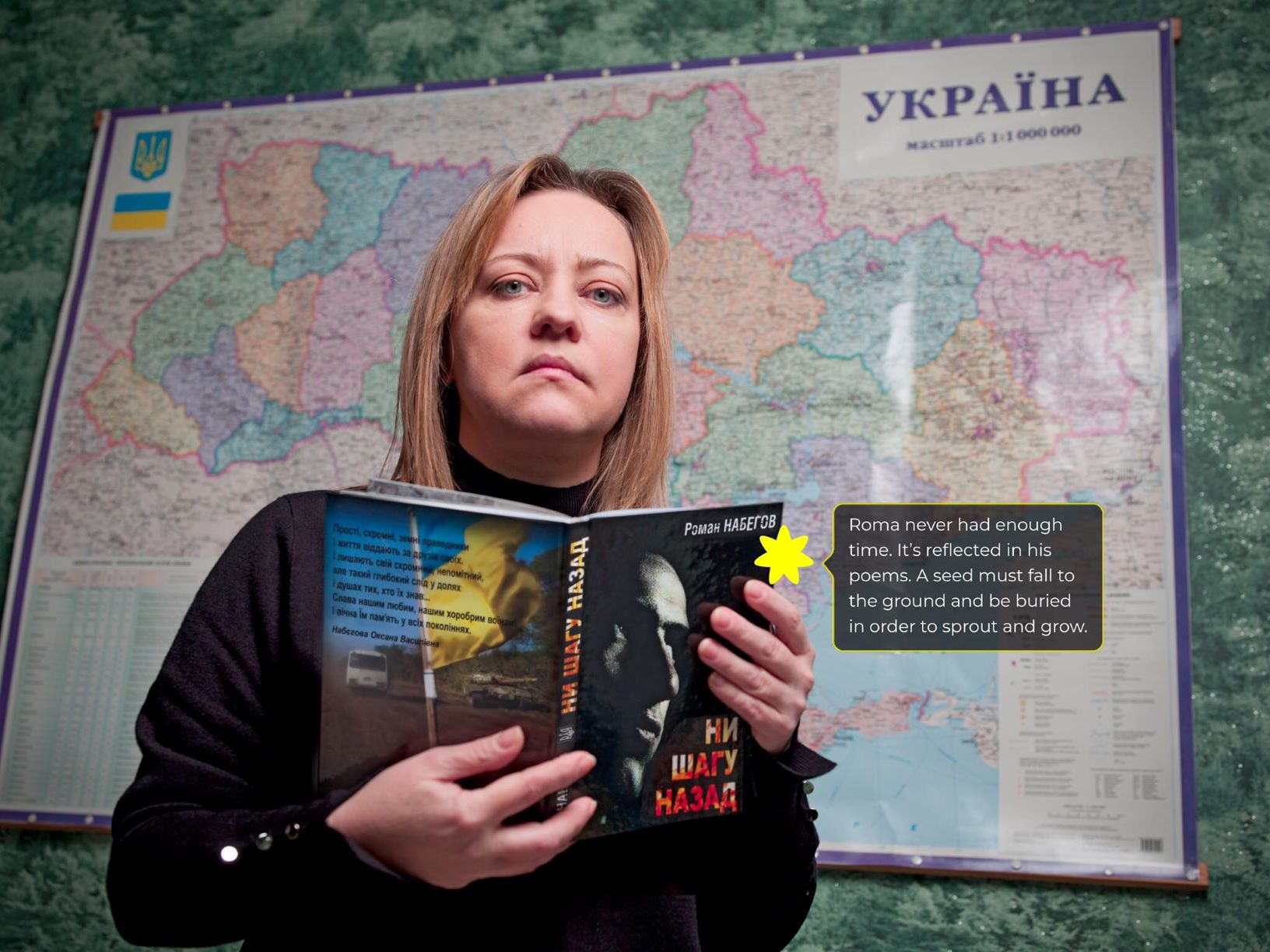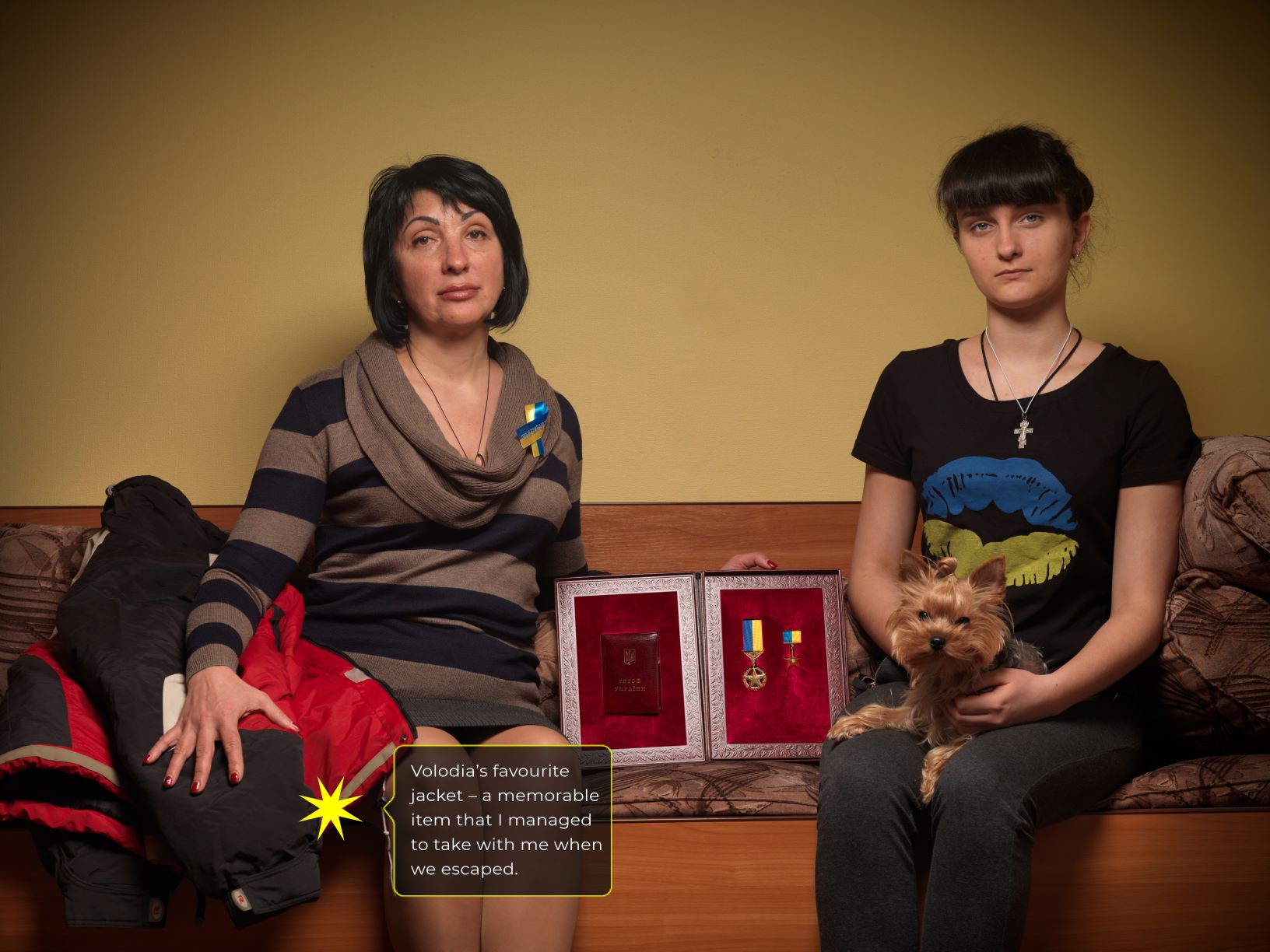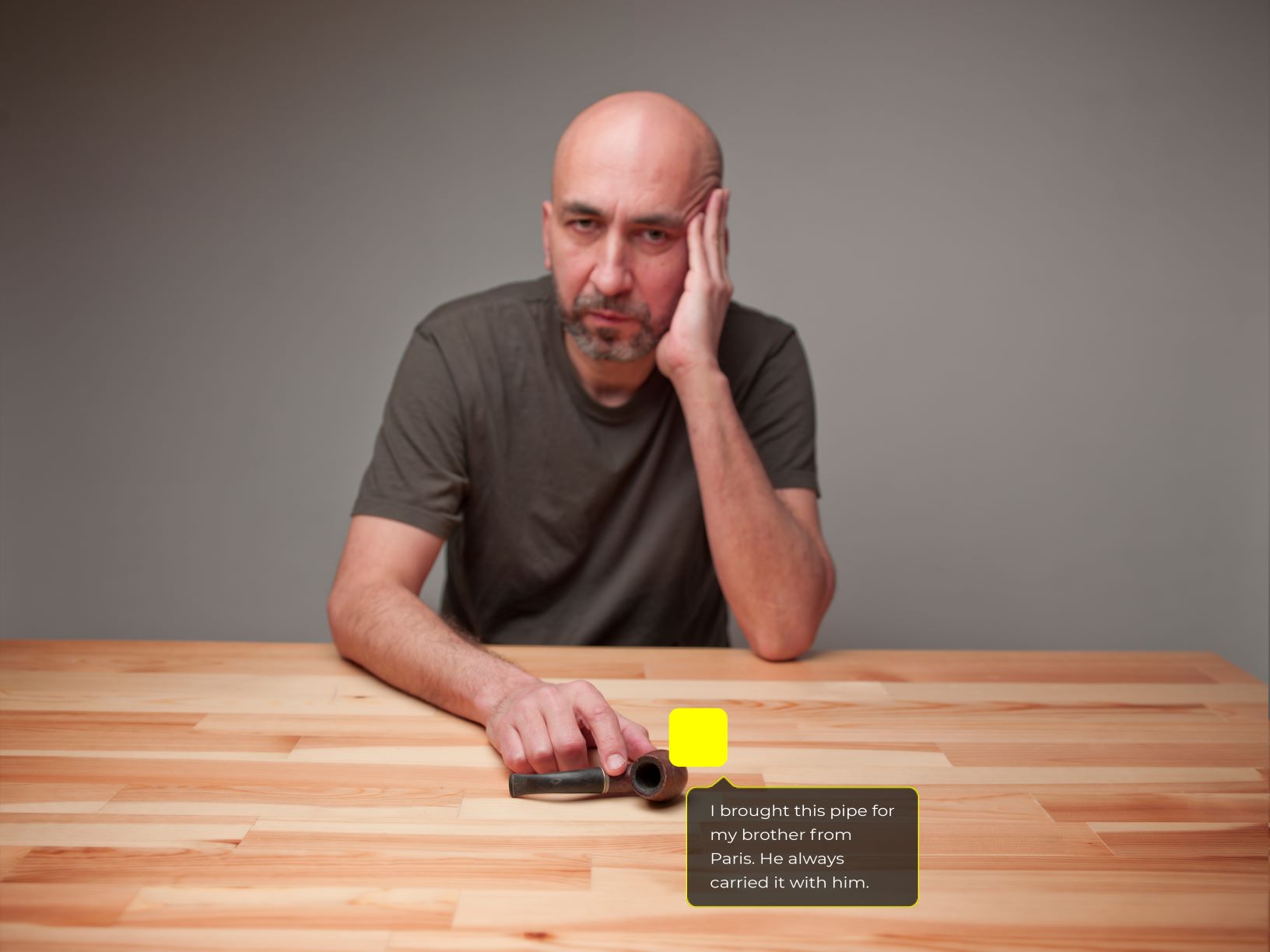Andriy Nazarenko was a big man with a kind heart. He participated actively in the Maidan, was part of Mariupol’s Self-Defence units, and one of the first volunteer fighters in the Donbas. Andriy served as gunner and reconnaissance scout in the 131st Reconnaissance Battalion.
On June 20, 2015, Andriy led a reconnaissance group into enemy territory near Pavlopil, Donetsk Oblast in order to localize and destroy a Russian sabotage commando. The group came under enemy ambush; two Ukrainian soldiers were killed – Andriy Nazarenko and Volodymyr Moloserdov.
It is part of the Plus 1 project created to memorialize the fallen Defenders of Ukraine.
NAZARENKO THE MECHANIC
Author: Anton Sanchenko
Andriy’s reconnaissance comrades were not very original when they first named him “Malysh” (Kiddo). This, or something similar, was his nickname at the Odesa Naval Academy and on all the international steamers he worked as a mechanic - not “Maniunya”, but “Maliuk” or something similar in Greek, English or Filipino. Well, how else can a short Filipino machinist express the chill and thrill he feels standing before this giant of a man - 198 centimetres tall, wearing 49-size shoes? Especially when this massive hulk easily touches the ceiling light of the corridor of the main deck. Not with his head, but with his shoulders! The tiny Filipino couldn’t touch the ceiling even if he jumped!
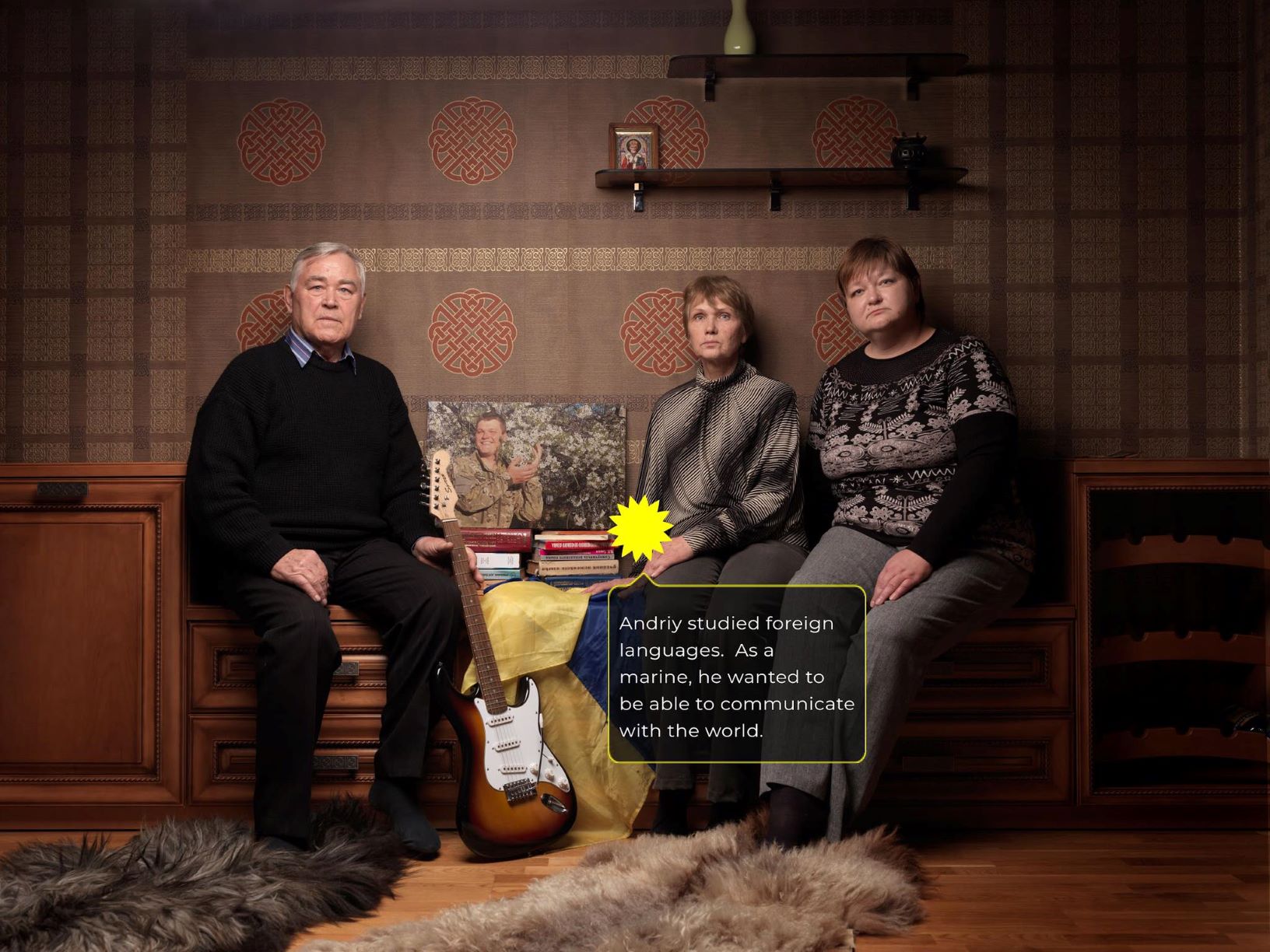
Once, Andriy and his shipmates visited the Turkish baths in Istanbul. The third assistant had forgotten something in the locker room, so he returned and with a guffaw, beckoned the others to take a peek into the room. The scene was absolutely hilarious – about a dozen Turks, clicking their tongues and shaking their heads in wonder, had gathered around Andriy’s oversize sneakers. After all, no such giants exist in Türkiye! He had a never-ending problem buying shoes in another country. In Türkiye, his size was only 44. In Ukraine, it was 46. At school, he was allowed to wear brown shoes with his black flared pants, as that was the only colour he could find in his shoe size. It’s great that there are still basketball players and sports shops in this world… and electric guitars. He bought his guitar abroad, choosing it carefully, comparing the prices to a Fender or a Stratocaster, and then brought all the music paraphernalia, including an amplifier, on board the ship. What else is there to do on a steamer after guard duty ? Why not practice and play the guitar? Go out on the main deck, fasten yourself down with a cable, look out at the horizon - the red sun setting into the pinkish waves, an albatross croaking as it flies by, cormorants cackling loudly, a flying fish jumping and disappearing into the waves, aromas of tuna cutlets wafting from the galley – and there you stand, singing loudly - Smoke on the Water! (by Deep Purple-Ed) Oh yes, Ritchie Blackmore himself! (English guitarist and songwriter, one of the founding members of Deep Purple-Ed)
 He wasn’t offended that he had to buy military fatigues and boots for himself. Everybody thinks that sailors earn good money, that they rake in large bills with a Stakhanovite shovel (heroically hard-working; named after Russian coal miner, Aleksei Stakhanov, who set a record for mining coal and was exceptionally productive-Ed). Perhaps, but he spent almost all his savings on volunteer stuff – handling equipment, tactical vests, red-dot sights and bulletproof vests for the men… but this was at the beginning, when tensions were growing. In mid-May, he managed to return from a journey to South America via Donetsk Airport, which didn’t yet bear the name DAP. A week later, Russian “tourists” invaded the airport in five KAMAZ vehicles, but they were quickly crushed by the Kirovohrad Special Forces and the only operational Ukrainian aircraft. It seemed to everyone that they had learned their lesson.
He wasn’t offended that he had to buy military fatigues and boots for himself. Everybody thinks that sailors earn good money, that they rake in large bills with a Stakhanovite shovel (heroically hard-working; named after Russian coal miner, Aleksei Stakhanov, who set a record for mining coal and was exceptionally productive-Ed). Perhaps, but he spent almost all his savings on volunteer stuff – handling equipment, tactical vests, red-dot sights and bulletproof vests for the men… but this was at the beginning, when tensions were growing. In mid-May, he managed to return from a journey to South America via Donetsk Airport, which didn’t yet bear the name DAP. A week later, Russian “tourists” invaded the airport in five KAMAZ vehicles, but they were quickly crushed by the Kirovohrad Special Forces and the only operational Ukrainian aircraft. It seemed to everyone that they had learned their lesson.
 He spent the tense events of February-May 2014 in Mariupol far away, on a steamer. He returned to the city with its charred police station and the half-destroyed first floor of the City Council, broken barricades and a scorched infantry fighting vehicle near the checkpoint. He blamed himself for being at sea during those difficult days. Of course, no one would have had the courage to reprimand him, a sailor, but they probably laughed behind his back. And when the military draft began, they were probably in stitches, because he wasn’t there to sign the military summons… he was conveniently somewhere in Singapore or Las Palmas, and he didn’t have to pay anyone off. Indeed, he’d saved himself a pretty penny!
He spent the tense events of February-May 2014 in Mariupol far away, on a steamer. He returned to the city with its charred police station and the half-destroyed first floor of the City Council, broken barricades and a scorched infantry fighting vehicle near the checkpoint. He blamed himself for being at sea during those difficult days. Of course, no one would have had the courage to reprimand him, a sailor, but they probably laughed behind his back. And when the military draft began, they were probably in stitches, because he wasn’t there to sign the military summons… he was conveniently somewhere in Singapore or Las Palmas, and he didn’t have to pay anyone off. Indeed, he’d saved himself a pretty penny!
The simple fact is that sailors have their own hardships to deal with, something that those sneering do-gooders can’t understand. He who has not been to sea, has never prayed to God, does not know… On one of the sea journeys, a young machine assistant from Sri Lanka was killed when he slipped and fell from a storm ladder as he was getting off the crew boat. The divers recovered his body. Andriy was surprised that his family and friends had no inkling about life at sea.
-So, where’s Andriy now?
-Oh, on a sea journey somewhere.
On what sea? On what steamer? Is he still a second mechanic or has he been promoted? Who knows! He’s on a steamer somewhere. A word that explains anything and everything, especially where all that money comes from. Sure, he spent most of it on equipment for the guys at the front, but he was still embarrassed, as if he had been caught fleeing a fire. So when the shipping company called him about the next sea journey and told him that it was a great ship, a Dutch steamer, just two years in service, that the engine purred like a content cat, that it would be docking at major ports of old Europe, Andriy sighed and said:
-Sorry sir, I need to take a year off. You know what’s going on here.
-Andriy, I understand, you don’t need to explain, answered the company supervisor. Are you from the city they showed on the BBC? The one that was shelled yesterday? God bless you, engineer! Your job is waiting for you as soon as you get back. Talk soon!
That’s when he went to the recruitment office for the first time, without waiting for a summons. He said he was volunteering to go and fight, but they refused and almost sent him to a psychiatrist. Yes, the old recruiting officer who had built himself a cosy waterfront dacha thanks to some generous “donations” from conscripts was surprised that someone was actually eager to defend this country and even his dacha against Putin’s troops.
“Hey, son! Are you in your right mind?” - shouted the officer.
“And what about you?” - asked Andriy, stretching to his full height.
For some reason, the military commissar choked loudly and fled down the corridor.
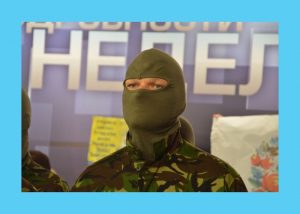
So, when the enemy began attacking Mariupol from Shyrokyne, he joined some other guys to dig trenches. Well, of course, with his Sakhanovite shovel, as in the old Communist anecdote. Well, it wasn’t all that bad, as they were also given an excavator. They used their shovels to level off the trenches and dig way down in the dugout, but that was it. Still, he knew how to operate a comparable machine in the hold or on the pier, so the excavator was his to operate now. In the end, out of fear, they dug up almost 200 kilometres around the city. Then, it became clear that fighters, and not diggers, were needed. There were rumours and stories about what was happening in the occupied territories, Putin’s so-called “Cossacks”, the rampant looting, and dissidents thrown into dark, abandoned cellars.
“You’ll be the first to be imprisoned,”- he told his parents. “For nothing. We have to stop them!”
That’s when he went to the recruitment office again and bribed the medical commission. Well, sailors are used to that. Don’t ask for explanations, it’s a professional thing. It’s not hard to get what you want from the marine commission in Odesa: 20 years - 20 dollars, 30 years - 30 dollars, 40 years - 40 dollars. And if you protest, those swindling doctors will ask you to undergo more tests and take 100 dollars more! There are no healthy people left in our world. So, after such experiences, the recruitment office was a piece of cake. But, they really shouldn’t have assigned him to the infantry due to his bad eyesight. He’d been wearing glasses since he left the naval academy. But, that’s how it is: ship mechanics don’t need to see the vessel’s course or the glimmering lighthouse. However, a machine gunner must take aim and fire.
They wanted to send him to serve on a border patrol boat. He said he was ready to serve as a mechanic, but insisted that what he really wanted was to serve as a machine gunner and scout in a reconnaissance battalion. He exchanged his guitar for a machine gun.
“I came to fight, not to twiddle my thumbs,” - he said.
But, like I said, guys in the reconnaissance unit had little or no imagination and at first, called him “Malysh” (Kiddo). Then, after a month of exercises at the military training ground, when it turned out that no one could repair a broken vehicle better than him – after all, there was no mention of such duties in the soldier’s manual - his mates respectfully changed his call sign to “Mec”.

He and his sabotage reconnaissance unit ventured several times deep into enemy territory, and the outcome of their “excursions” were often shown on Russian TV with the Russian host cursing those damn Ukrainians. We all know what was in those Russian “humanitarian convoys”, what kind of “firewood” was delivered to the locals, what was in those white KAMAZ trucks. But, he told his parents that he was still training, that the room was full of tired, nicely-tanned men in battle fatigues, who were resting side by side on the floor after doing their laundry. Or how they’d managed to get leave for the day. He never hesitated and always answered their questions.
“Where are you, son?” – they’d ask.
“Well, you know where I am… I’m on guard duty now.”
He used to answer – “on a steamer”, but now it was “on guard duty”.
The last time he called home was on June 19. He and his comrades were walking through the village of Volodarsky, eating ice cream and chebureks (Caucasian meat patties-Ed) and looking at some turtles. What a strange scene! Eating ice cream in the middle of a war!
On June 20, 2015, his reconnaissance unit was near Pavlopil, in the gray zone, trying to slip behind the front line along the dry bottom of a reservoir. They fell into an enemy ambush. Machine gunner “Mec” was in front, the first to take the bullet. Calm, big-hearted giants are an easy target, especially from an ambush position. You have time to take aim at such a big target. Unfortunately, reconnaissance scouts don’t wear bulletproof vests because they restrict body movement.
New vessels have always been named after a mechanic who served and died in the Navy. Well, perhaps only the most deserving. Of course, “Mechanic Nazarenko” would sound pretty good. But that won’t happen until Ukraine stops building new armoured vessels in Mykolayiv or Kherson, and starts building peaceful tankers and dry cargo ships, so that Andriy’s name can be engraved on the hull of a real steamer.
The project is built around 22 individual exhibition stands. In iconic and powerful moments captured by a photographer’s camera – Youry Bilak, a Frenchman of Ukrainian descent – Ukrainian families tell the stories of their loved ones – Ukrainian soldiers who perished in the war. Each narrative, each individual is but one small grain, one tiny unit of a module in a living organism. By telling his story, we bring him back to life.
Each family chose an object that most reminds them of their departed: a father’s jacket, a guitar, a suit of medieval armour, a book. These family artifacts reflect a living continuation of the departed loved one. Ukrainian artists, intellectuals, and journalists were invited to create original texts about each soldier.


